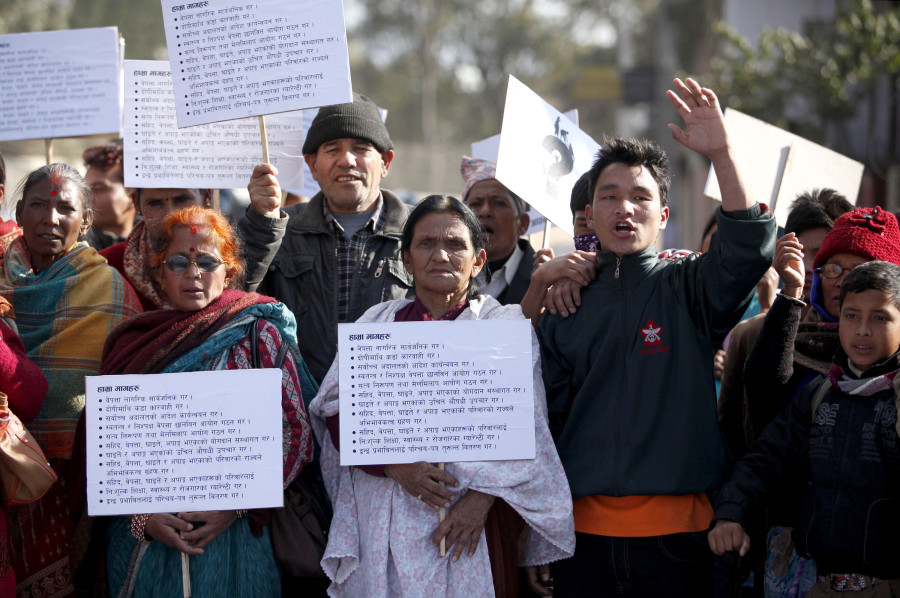Politics
Parties close to consensus on chairperson for Truth and Reconciliation Commission
Both ruling and opposition parties are positive about appointing Ganesh Datta Bhatta, associate professor at Nepal Law Campus, ruling party leaders say.
Binod Ghimire
The long-awaited appointment to the Truth and Reconciliation Commission finally looks like it might happen, with parties nearing consensus on Ganesh Datta Bhatta, associate professor at Nepal Law Campus, to lead the transitional justice body.
Sher Bahadur Deuba, president of the Nepali Congress, proposed Bhatta’s name in a recent meeting with Prime Minister KP Sharma Oli and Nepal Communist Party (NCP) Co-chair Pushpa Kamal Dahal. Deuba, who refused to attend Wednesday’s Constitutional Council meeting, has been miffed that the ruling party appointed members to the constitutional commissions without his approval, according to ruling party insiders. His proposal of Bhatta’s name, therefore, is believed to be a quid pro quo on appointments for the Nepal Communist Party.
“Oli and Dahal are positive on Deuba’s proposal,” said a ruling party leader who spoke on condition of anonymity as the appointment has not been finalised.
However, Datta, who is believed to have close relations with the Nepali Congress, is the party’s first choice for the truth commission, confirmed sources within the opposition party.
The parties have been looking for an alternative ever since former attorney general Raman Shrestha publicly refused to lead the commission.
The Truth and Reconciliation Commission and the Commission of Investigation on Enforced Disappeared Persons have been lying vacant since their chairpersons and members were relieved of their positions on April 14. A recommendation committee, led by former chief justice Om Prakash Mishra, was formed on March 25 but it is awaiting consensus among the parties to select office-bearers for the two bodies.
The recommendation committee is due to meet on Friday, after which the parties will be closer to finalising the names.
“We could list the names of probable candidates on Friday,” Sharmila Karki, spokesperson for the committee, told the Post. As many as 57 people, including retired judges from the Supreme Court and high courts, have applied for the 10 vacant positions.
However, officials at the recommendation committee say that very few applicants will receive places on the commissions. The political parties tend to pick and choose the leadership and members based on their affiliation, rather than on merit from the list of applicants.
The Conflict Victims Common Platform, an umbrella body of organisations representing victims of the decade-long insurgency, has started meeting with the cross-party leadership to put pressure for an amendment to the transitional justice law and for the appointments to be transparent.
Victims, along with national and international human rights organisations, have expressed concern over how opaque the appointment process is and that the two commissions cannot function as expected unless the Act is amended. The Supreme Court in 2015 issued a ruling asking for amendments to the Enforced Disappearances Enquiry, Truth and Reconciliation Commission Act-2014 at par with international standards and transitional justice norms.
“We’ve met [Pushpa Kamal] Dahal and [Barsha Man] Pun and have urged them to expedite the amendment and appointment process,” Bhagiram Chaudhary, chairman of the platform, told the Post. Pun is the Nepal Communist Party’s representative in negotiations over the appointments, as he represents the former Maoist faction in the party.
“We want the parties to take a landmark decision on the 13th anniversary of the signing of the peace accord,” said Chaudhary. The Comprehensive Peace Agreement, which ended the decade-long insurgency, was signed on November 21, 2006, and paved the way for the then rebel Maoists to join mainstream politics.
Around five years have passed since the formation of the truth and disappearance commissions, but they have done little besides collecting complaints from the victims and their families. Some 66,000 complaints have been registered with the two commissions.




 13.12°C Kathmandu
13.12°C Kathmandu














